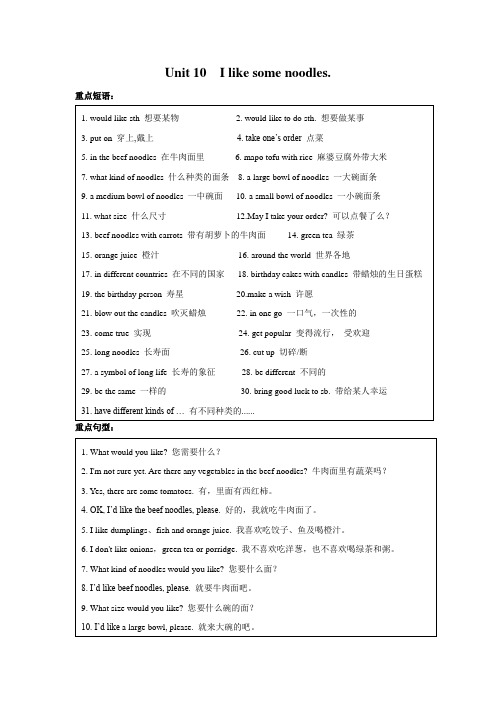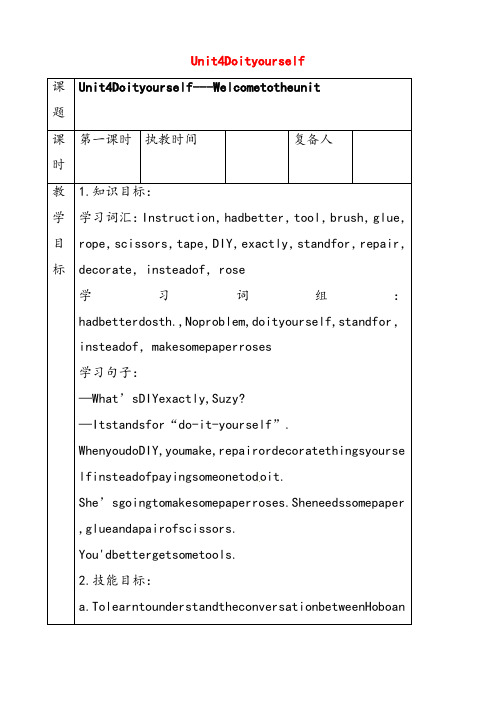what_do_you_like_to_do导学案
人教版六年级上册英语导学案unit1howcanigetthere

Unit 1 How can I get there?Period One学习目的:1.熟读Let's talk并掌握问路的句型,理解I want to... 构造和what 引导的感慨句。
2.可以听懂Let's try的录音内容并选出正确选项。
一. Review to understand.(温故知新)Answer the questions.(给问句找出答语,将序号写在横线上。
)1.When do you get up? A. I’m drawing a picture.2.What do you do on weekends? B. I usually get up at 6:30.3.Which season do you like? C. I often watch TV.4.When is your birthday? D. It’s in March.5.What are you doing? E. Spring.二.Warm-up〔热身活动〕Read and match.(读一读,连一连。
)1.A.……附近三.Self check(自学检测)1.Look the the picture on Page 4 and write.(看课本4页Let’s talk,补全对话。
)---Robin,Where is the museum shop?________________________.----It's ______________.----Thanks.________________________?I want to send it today.----I don't know. _____________.________________________.----Wow ! _____________.________________________!---- ________________________.----It's _____________the museum.----Thanks.2.Read the above sentences in groups.(四人小组朗读上面的句子,并对同伴做出评价。
Unit10同步讲练导学案2021-2022学年人教版七年级英语下册

Unit 10 I like some noodles. 重点短语:重点句型:第一课时Section A (1a—2d )导学设计:1. I’d like some noodles.我想要一些面条。
【归纳】would like表示委婉地提出要求、建议或看法,与意思相同,但语气比want 委婉,多用于口语中。
would是情态动词,无人称和数的变化。
【常用的结构】would like sth.想要某物;would like to do sth. 想要做某事;would like sb. to do sth.想让某人做某事I would like some milk.我想要一些牛奶。
He would like to watch TV. 他想去看电视。
My mother would like me to go to bed early.我的妈妈想让我早点休息。
【拓展延伸】What would you like?你想要什么?Would you like sth? 你想要某物吗?Would you like to do sth?你愿意做某事吗?2. What size would you like?你想要多大号碗的?【归纳】size是名词,意为“”,既可以表示物体大小,也可以表示服装、鞋帽的尺码,大中小号分别表示为large size, medium size, small size。
what size用来提问尺寸大小,意为“多大……”。
例如:— What size shoes would you like? 你穿多大号的鞋子?— I wear size 40. 我穿40码的。
【补充】What’s the size of…? ……的尺码/大小是多少?What’s the size of the house? 这座房子有多大?3. May I take your order? 您现在可以点菜了吗?【归纳】(1) May I …?是用于的常用句型。
小学四年级上册英语导学案

四年级上册英语导学案设计:备课日期:月日教学日期:月日学习达人:学习课题Unit 1 Nice to meet you!学习目标1.能听懂、会说本课会话;2.能运用“Nice to meet you!”问好,并对此问候作出回应;3.能在适当的场合运用“Hello!”和“Good morning!”学习重点自我介绍,以及灵活运用“Good morning! Glad to meet you!”向人致意。
学习难点“Hello!”和“Good morning!”的区别。
学习程序第二课时一、课前独学预习单词及课文,请将下列单词和句子在课本中划线并译成中文。
afternoon, this, name, dog, class, grade, Who are you?What’s your name?【我的疑问】:请你将预习中未能解决的问题和有疑问的问题写下来,待课堂上与老师和同学探究解决。
二、有效热身师生问候。
T:Good afternoon!Ss:Good afternoon!T:Nice to meet you!Ss:Nice to meeet you too!三、课堂合作和探究1. 课堂导入师用肢体语言引入问候语,Good morning. Good afternoon.2. 检查独学小组内自查独学情况,老师抽查。
3. 呈现新句型 Nice to meet you!What’s your name? Who are you?4.两两合作根据新句型两人一组一问一答。
5.朗读指导学生在组内自己阅读讨论D部分,理解D部分的内容。
6.问答练习学生在组内完成E部分的练习。
7.解决疑问师生合作一起解决预习中遇到的、通过课堂合作探究尚未解决的疑问四、课堂展示1 .每个小组成员朗读一遍D部分。
2.小组派代表解说E部分的答案。
五、达标检测我会做:翻译下列句子。
1. Good afternoon.2.Who are you?3.What’s your name?4.I’m in Class Two, Grade four .我会写:正确书写句子。
牛津译林版八年级英语上册Unit4Doityourself精美教案

Unit4Doityourself课题Unit4Doityourself---Welcometotheunit课时第一课时执教时间复备人教学目标1.知识目标:学习词汇:Instruction,hadbetter,tool,brush,glue,rope,scissors,tape,DIY,exactly,standfor,repair,decorate,insteadof,rose学习词组:hadbetterdosth.,Noproblem,doityourself,standfor,insteadof,makesomepaperroses学习句子:—What’sDIYexactly,Suzy?—Itstandsfor“do-it-yourself”.WhenyoudoDIY,youmake,repairordecoratethingsyourse lfinsteadofpayingsomeonetodoit.She’sgoingtomakesomepaperroses.Sheneedssomepaper ,glueandapairofscissors.You'dbettergetsometools.2.技能目标:a.TolearntounderstandtheconversationbetweenHoboan任务二:Presentation Showsomepicturestotalkabouthowtodoity ourself.T:EddieandHobowanttodosomethingbythem selves.Ask:Howcanwedoityourself? DIYasweater:如果你觉得自己的sweater 太过单调,可以试着在上面画一幅画。
过程Step3:课堂导学与互动任务一:Freetalk1.DoyoulikeDIY?2.HaveyouevertriedDIY?Whatisit?3.DoyouwanttotakeacourseinDIY?任务二:ListenandfinishPartB1onPage45. Matchthewordsontheleftwiththemeaning sontheright.任务三:FinishPartB2onPage45.Suzy’scousinAndrewiscrazyaboutDIY,b utheisnotverygoodatit.Liste ntoSuzy’sarticleandmatchthejobshedidwiththep roblemshecaused.任务四:ReadandfinishPartB3onPage46. 任务五:WatchandfinishPartB4onPage46. Step4:总结提升Workinseveralgroups. Makeupsentenceswithyourpartnersw iththephrasesabove.Speakthemouttous.Let’sseewhichgroupisthemost active.学法指导查阅资料与练习相结合。
八年级上册英语同步导学案答案

八年级上册英语同步导学案答案Unit 1Period one学点训练1. How often2. How long3. How soon达标检测一 1.once 2. watches 3.activities 4. is 5. surfing二 1. surfing the Internet 2.favorite program 3. How often 4.twice a week 5 hardly ever三 What do you usually do on Sunday?What sport do you play?Yes, I doHow often do you play soccer?How long do you play soccer every day?Period two学点训练1 Most2 Some3 No4 All达标检测一 BBBBBB ABBCC二 ABBABPeriod three学点训练1. am good at2. is good for3. Are good with4. is good to 达标检测一 CACCA二(1)它(垃圾食品)对他们的健康有害。
(2)他们知道这不是个好习惯,但是他们还是吃。
(3)他们中有些人每周吃一两次。
(4)他几乎从不锻炼。
(5)也许我不是那么健康,但是我会觉得很开心。
Period four学点训练1. may be2. Maybe达标检测一 1.eating ,2.to speak,3. differences,4. help better,5. Reading二 BBCCA三 BABBAPeriod five达标检测Period one一 CABBB二 1.As for, hardly ever 2.How often, Four times 3,Eating lots of, is good for 4.junk food, doesn’t, healthy lifestyle 5 tries to exercise三 BBAAA ABAABUnit 2Period one达标检测一 1 fever 2 nose 3 neeks 4 mouth 5 stomachache 6 toothache 7 matter, throat, honey二 CACCC三 1,keeps 2,feet 3 drink 4,had 5 were,isPeriod two达标检测一what’s the matter with you?I’m not feeling well.When did it start?go to see a doctoryou feel betterYou’re welcome二 CBCCC三 ABBAAPeriod three达标检测一 CBCBC二I’m sorry I can’tWhat’s the matter with you?Why do you have a headache?You should do more exercise.I hope you feel better soon.三 CACBCPeriod four学点训练1 to say ,to learn2 much too, too much, Too many3 a few, few, a little, little达标检测一 1 angry ,2 important 3,balanced 4, weak 5.western6.traditional7.early8.habit.9 medicine10.Believe二 CBBCABBBBBPeriod five达标检测一 1 to see 2 lying 3 eat, to say 4 singing 5 Is二1 didn’t stop until 2 feeling well cold 3 stressed out,unhealthy 4 weak in 5 moment improvingUnit3Period one达标检测一、1 leaving 2 are doing are playing 3 sounds 4 are doing are 5 camping二、1——5 BCCCC 6——10 ABCACPeriod two达标检测一、1——5 BCBAC二、1、postcard 2、 mountain 3、babysits 4、away 5 、hiking三、where are you going for vacation?How long are you staying there?What are you doing there?Have a good time.You’re welcome!Period three达标检测1. going bike riding, taking walks.2. to go sightseeing.3. relaxing vacation4. going fishing5. rent videos.Period four学点训练C on to达标检测一 1 getting 2 reading 3 to close 4 to rent 5 to buy二 ABCCC BBBCCPeriod five达标检测一 1 tourists 2 famous 3 Europe 4 something 5 leaving二 1 are leaving ,staying 2 exciting, excited 3 talking 4 to be 5 are visiting三书面表达略(注意be +doing and be going to 的使用)relaxingUnit4Period one学点训练1 by bus2 take the subway3 on foot达标检测一 1 foot 2 rode ,had 3 by 4 got 5 does,get,walks,does,take,takes,minutes.二 DBCAE三 1 那有点远。
四年级下英语教学设计-Lesson 17 What Do You Like to Do-冀教版

四年级下英语教学设计-Lesson 17 What Do You Like to Do-冀教版教学目标1.学生能够听、说、读、写以下单词:play, watch TV, read books, draw, ride a bike, sing, dance, swim, play soccer。
2.学生能够用“What do you like to do?” 这个问题询问他人的喜好,并能回答这个问题。
3.学生将学习掌握以下句型:–I like to play soccer.–He likes to read books.–She likes to draw.–They like to swim.教学准备•单词卡片或图片卡片:play, watch TV, read books, draw, ride a bike, sing, dance, swim, play soccer。
•习题卷子和答案。
•音乐、球或其他体育器材。
教学过程自我介绍教师先以自我介绍开始这堂课,通过这种方式引起学生的兴趣,增加教学的趣味性。
造句活动教师先给出一个单词,希望学生们能用这个单词造句,例如:•Teacher: “Play”.•Student: “I like to play soccer”.•Teacher: “Watch TV”.•Student: “He likes to watch TV”.单词学习教师通过单词卡片或图片卡片给学生们呈现出以下单词:•play, watch TV, read books, draw, ride a bike, sing, dance, swim, play soccer。
教师可以用游戏或者互动的方式来加深学生对这些单词的印象。
句型学习教师可以通过演示或者引导学生来练习以下句型:•I like to play soccer.•He likes to read books.•She likes to draw.•They like to swim.教师可以用听音、打板子、口头练习等方式来加深学生对这些句型的记忆和理解。
新外研版八年级英语下册导学案Module 10-On the radio(Unit1-Unit3)

外研版八年级英语下册导学案Module10 On the radioUnit1 I hope that you can join us one day一、学习目标:1.知识目标:(1)掌握下列词汇:director, avoid, background, background, national, international, interview, on air, presenter(2)掌握下列句型及短语:①Thank you for showing us around.②When it’s o n, it means we’re on air.③Come this way.④It gets crazy in here.⑤show sb. around ⑥on air⑦avoid doing sth.⑧make noise ⑨in the backgroun⑩ keep studying2.能力目标:能够听懂和读懂在广播中常用的词汇、短语和句型,并将节目与常用词汇对应起来。
3.情感目标:初步了解新闻传媒,了解媒体人的工作。
二、学习重、难点:1.重点:掌握宾语从句,掌握动词后接(to)+v.或v.ing的形式。
2.难点:掌握动词(to)+v.或v.ing的形式作宾语三、自主学习:1.词汇速记引领,带领(v)________ 避免,防止(v)________背景(n)__________国家的,国内的(adj)______direct(v) → _____(n)导演,主管,经理present(v) → __________(n)主持人2.短语互译be on________ avoid doing sth___________ make noise_____________come this way_____________ over there______________带某人参观______________(广播或电视)播出_________________四、学习过程:Step1. Warming-upFree talk: Do you listen to the radio?Do you like listening to the sports news programme?Do you like listening to the news programme?Do you like listening to music?Which presenter do you like best?Step2.Pre-listening1.Listen and check(√ ) the types of news you hear.culture government sports weather2.Listen again and complete the sentences.(1)Zhang Li reads ______________________________________ on Radio Beijing.(2)The president of Russia will stay in China for________________.(3)The match is between _______________and_________________.Step3.Fast-listeningListen and answer:1.What should we avoid doing in the background?2.Do they collect the latest national and international news in the newsroom?Step4.Careful-listeningListen again and complete the notes.1.When the red light is on,it means______________________________________.2.We collect_____________________________and write reports in the newsroom.3.You should________________________________if you want to be a presenter.4.This is also where we_________________________with the big sports stars.plete the sentences with the words in the box.1.Newspaper and television programmes often have__________with famous people.2.More and more ___________students are coming to China to learn Chinese.3.Every country has its own ________hero—a person who did something very important for the country and its people.4.Try to_______drinking too much tea or coffee, or you will not be able to sleep well.5.Could you speak a l ittle bit louder,please?It is very noisy in the ________________.Step6.Work in pairs.Ask and answer questions about the radio.1.What do you like listening to?2.What do you not like listening to?3.What programme did you listen to the last time you turned on the radio?4.What do you need to do if you want to be a presenter?nguage points.1.show v. 引领,带领【语境领悟】*Thank you for showing us around. 感谢你带领我们参观。
Unit 2 What time do you go to school 导学案(含答案)

❶ at作介词,无论表示时间点还是空间点,at都用于“小而具体”的名词前,比如时间表达“在几点”,地点表达“在哪儿”。
eg:at the moment此时此刻at nine o'clock在9点at noon在中午
❷ in的本意是“在……之内”,表示时间的时候,指的是在一个比较长的时间段之内,表示地点的时候,表示在地点名词内部。
【辨析】:work与job
work
不可数名词
泛指抽象意义的工作。
job
可数名词
指具体的某种工作或职业。
eg:My brother has a job(n. ). He is a worker(n. ) and works(v. ) in a factory. He likes his work(n. ) very much.我哥哥有一份工作。他是一名工人,在一家工厂工作。他非常喜欢他的工作。
7.because we have a shower schedule.
____________________________________________________________________
8.He works at a radio station.
____________________________________________________________________
5.What time do you usually take a shower, Rick?
____________________________________________________________________
